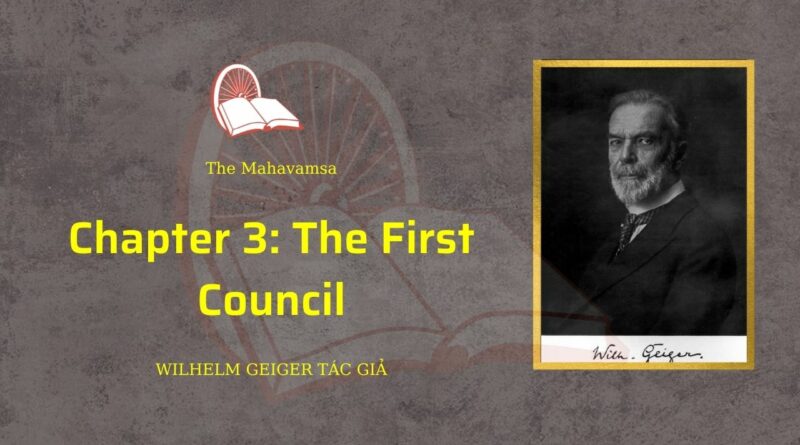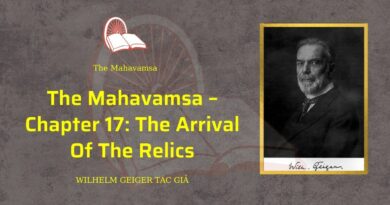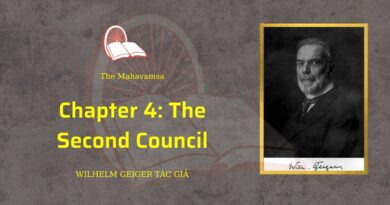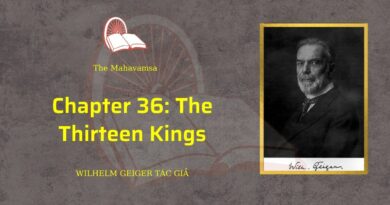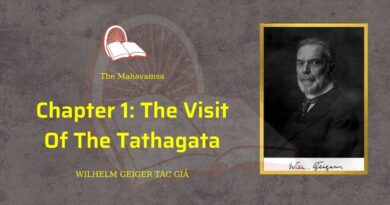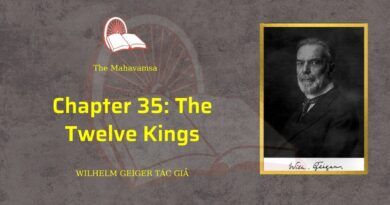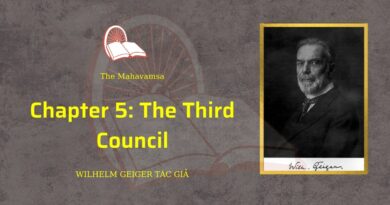THE MAHAVAMSA – CHAPTER 3: THE FIRST COUNCIL
WHEN the Conqueror the incomparable, he who has the five eyes,’ had lived eighty-four years and had fulfilled all his duties in the world, in all ways; then at Kusinara in the holy place between the two siila-trees, on the full-moon day of the month Vesakha was the light of the world extinguished. Beyond all reckoning in numbers, did bhikkhus assemble there and khattiyas and brahmans, vessas and suddas, and gods likewise. Seven hundred thousand leading bhikkhus were among them, the thera Mahakassapa was at that time the samghatthera.
When he had performed all rites due to the (dead) body of the Master and the bodily relics, the great thera, desiring that the doctrine of the Master might long endure, did, seven days after the Lord of the World, gifted with the ten powers, had passed into nibanna, bethinking him of the evil words of the aged Subhadda and also bethinking him that he (the Master) had given him his garment,’ and had (thereby) made him equal with himself, and (bethinking him) that the Sage had commanded the establishing of the holy truth, and (lastly) that the Sambuddha’s consent existed to make a compilation of the holy dhamma appointed to this end five hundred eminent bhikkhus, who had overcome the ãsavas, repeaters of the ninefold doctrine and versed in all its separate parts; but there was one less (than five hundred) because of the thera Ananda. And the thera Ananda also, again and again entreated by the bhikkhus, resolved to (join with them in) that compilation of the dhamma, for it was not possible without him.
When these theras, pitiful toward the whole world, had passed half a month seven days in the funeral ceremonies and seven in homage of the relics and had resolved thus: ‘Spending the rainy season in Rajagaha, we will make a compilation of the dhamma, no other (monks) must be permitted to dwell there’; and when they had made their pilgrimage over Jambudipa, consoling here and there the sorrowing people, they, moved with desire that the good might long endure, betook them in the bright half of the month Asalha to Rajagaha, (the city) richly provided with the four things needful.
After the theras, with Mahakassapa at the head, unwavering in virtue, familiar with the thought of the Sambuddha, had arrived at that place to spend the rainy season there, they busied themselves during the first of the rain-months with repairing all the dwellings, when they had announced this to Ajatasattu.
When the repair of the vihara was finished they said to the king: ‘Now we will hold the council.’ To the question, ‘What should be done?’ they answered: ‘A place (should be provided) for the meetings.’ When the king had asked: ‘Where (these were to be)?’ and the place had been pointed out by them, he with all speed had a splendid hall built by the side of the Vebhära Rock by the entrance of the Sattapanni grotto, (and it was) like to the assembly-hall of the gods. When it was adorned in every way he caused precious mats to be spread according to the number of the bhikkhus. Placed on the south side and facing the north a lofty and noble seat was prepared for the thera, and in the middle of the hail a high seat was prepared for the preacher, facing the east and worthy of the blessed (Buddha) himself.
So the king bade them tell the theras: ‘My work is finished,’ and the theras addressed the thera Ananda, the joy-bringer:
‘Tomorrow, Ananda, the assembly (comes together); it behoves thee not to take part in it since thou art still preparing thee (for the highest state), therefore strive thou, unwearied in good.’ Thus spurred on, the thera put forth due effort and reached the state of an arahaut without being confined to any one of the four postures.’
On the second day of the second month of the rainy season the bhikkhus met together in that splendid hail. Leaving a fitting place vacant for Ananda, the arahants seated themselves on chairs, according to their rank. The thera Ananda, to make known to them that he had reached the state of an arahant, went not with them thither. But when some asked: Where is the thera Ananda? he took the seat prepared for him, rising out of the ground or passing through the air.
Together the theras chose the thera Upali to speak for the vinaya, for the rest of the dhamma they chose Ananda. The great thera (Mahakassapa) laid on himself (the task) of asking questions touching the vinaya and the thera Upali (was ready) to explain it.
Sitting in the thera’s chair, the former asked the latter the questions touching the vinaya; and Upali, seated in the preacher’s chair, expounded (the matter). And as this best master of the vinaya expounded each (clause) in turn all (the bhikkhus) knowing the custom, repeated the vinaya after him.
Then the thera (Mahakassapa) taking (the task) upon himself questioned concerning the dhamma, him the chief of those who had most often heard (the word), him the treasurekeeper of the Great Seer (the Buddha); and the them Ananda, taking (the task) upon himself, taking his seat in the preacher’s chair, expounded the whole dhamma. And all the (theras) knowing all that was contained in the doe. trine repeated the dhamma in turn after the sage of the Videha country.
Thus in seven months was that compiling of the dhamma to save the whole world completed by those (theras) bent on the whole world’s salvation. ‘The thera Mahakassapa has made the blessed Buddha’s message to endure five hundred years,’ rejoicing in this thought, at the end of the council, the earth encircled by the ocean trembled six times and many wondrous signs were shown in the world in many ways. Now since the canon was compiled by the theras it was called tlw Thera tradition.’ The theras who had held the First Council and had (thereby) brought great blessing to the world, having lived their allotted span of life, entered, all, into nibbana.
Also the theras who have overcome darkness with the light of insight, those great shining lights in the conquest of the world’s darkness, have been extinguished by the dread tempest of death. Therefore will the wise man renounce the joy of life.

